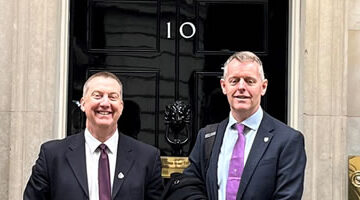President’s Blog April 2016
Welcome to our new blog where I’ll be sharing news, developments and my thoughts on various issues on all things emergency medicine. You’ll find an archive of old EMJ news items that I’ve written over the years, and you’ll be able to tell me your thoughts in the comments sections in future posts.
But firstly I would like to start by congratulating Taj Hassan on being elected as the new College President. I’m looking forward to working with him in these next few months to ensure a smooth transition and I’m sure he’ll make a great President. I’d also like to offer the other three candidates the thanks of all the members and fellows of the College. To have had such a high calibre field from which to choose my successor has ensured that the College will continue to develop and succeed. In the meantime I still have a few more months before handing over at the AGM during our Annual Scientific Meeting, in Bournemouth in September. I trust that you will all indulge me a little longer.
There is much to report currently, not least because there was no March edition of the EMJ supplement – an unreported victim of the Easter Bunny perhaps? Most of you will by now have heard me speak, sometimes at length and for some poor souls, on more than one occasion, about the challenges we face in EM. It has been my privilege to travel widely and meet so many RCEM members. However it is of course true that in some regard speaking to EM doctors who know only too well the issues we face is akin to ‘singing to the choir’. I have therefore been particularly pleased of late to have spoken to two national meetings of NHS Finance Directors and alumni of Imperial College Business School. The opportunity to speak to several hundred senior finance directors was invaluable in highlighting the grotesque expenditure on short term temporary staff whilst squandering the taxpayers investment in EM emigrees.
Add to this the nonsense of tariffs, the laughable annual predictions of fewer attendances and admissions on which we are all supposed to predicate our plans, and the inexplicable and unjustified variation in staffing levels, and I found no difficulty in holding their attention for 45 minutes. The feedback was so good I plan to put it in my appraisal folder! Joking aside, it is essential to take our views, opinions and arguments to other groups, particularly managers and politicians.
This month we have published our latest report ‘Why does winter in A&E get worse every year?‘ which really shows just how great the pressure on A&E is over winter. It looks at the three main determinants of system performance – demand, hospital capacity, and flow – and what can be done to decongest EDs and better resource them to meet current and future challenges.
Most of the findings probably won’t come as any surprise to many of you, but please have a read and feel free to leave a comment below – I’d be interested to hear your thoughts.
I have recently been invited to meet with Simon Stevens (NHS England) and Jim Mackey (NHS Improvement) in a national steering group focused on ED capacity. It is always something of a quandary as to whether one is better off providing a critique from the sideline or joining the protagonists in the hope that in this way greater influence can be achieved.
I wrote last month of the policy progress the College had made particularly in Scotland and England and I am certain that this would not have occurred had we not been prepared to collaborate and contribute to the work of the Urgent and Emergency Care Review, the ECIST team and the departments of health. Rest assured neither I nor the College are about to forego our independence and candour. We will continue to speak as we find, highlight the inadequacies and iniquities of current service provision and promote and promulgate the evidence based solutions that we have developed over the last few years.
One current example of aligning our agenda with that of others is the publication of Lord Carter’s report examining productivity in the NHS. The college view is that productivity, efficiency and effectiveness are daily undermined by exit block, lack of non-EM Out of Hours urgent care and understaffing – particularly of senior decision makers. At the risk of singing the same tunes to the same choir, perhaps this should become a chorus – the current expenditure per year on ED locums would pay the annual running costs of 17 departments or allow us to double the number of EM consultants and still save money! We are absolutely primed for productivity discussions!
In other news related to recent and upcoming events; in Scotland we launched our fact sheet in Parliament in January at an event attended by the Cabinet Secretary for Health and many other senior politicians. Our Welsh fact sheet will be launched during the campaign for the Welsh Assembly elections. A visit to Dublin in February at the National Emergency Care Programme conference demonstrated that EM is ably led and enthusiastically supported by the trainers and trainees in Ireland. The food and drink, like me, were generously proportioned.
Last month it was great to meet so many RCEMers at the Leeds CPD conference. The Yorkshire Playhouse was a great venue – I kept expecting Alan Bennett to open a session with a cameo description of life in the back of an ambulance! It is becoming clear that our choice of venues will need to accommodate much greater numbers than erstwhile was the case. A problem that we are delighted to have.
Finally I am sure that some of you will be travelling to Cape Town for ICEM 2016. This looks set to be a great success and in particular to reflect the utility of EM even in resource poor countries. My time as President has emboldened my regard for EM but also broadened my view on the essentials of a good health care system. I believe that primary care and public health are the two essential pillars for long term health promotion and disease management. Emergency Medicine is the best way to deliver highly effective though relatively low cost interventions to reduce immediate threats to life and limb. The WHO have recently developed and are currently piloting an EM course for resource poor countries. Such work is a great opportunity for EM clinicians to participate in validated and sustainable projects overseas that can be delivered in a week rather than a year. Let me therefore conclude with mention of Dr Amy Hughes – an EM higher trainee in Plymouth who was awarded an MBE in the New Year’s Honours List for her humanitarian work – congratulations to her, the team at Keele University with whom she worked and the many others who undertake such altruistic endeavours. More reasons still to celebrate EM and all its practitioners.
Dr Cliff Mann
President
The Royal College of Emergency Medicine
@RCEMPresident


0 Comments